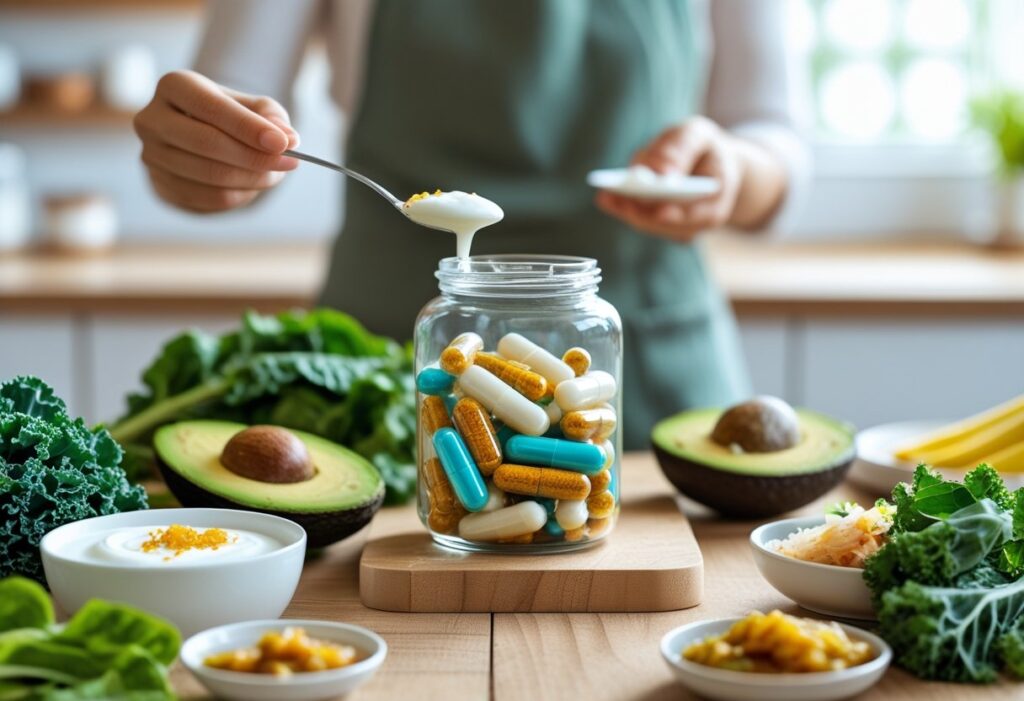Probiotics are live bacteria and yeasts that can offer benefits for gut health. They help balance the good and bad bacteria in the digestive system, which supports digestion and overall well-being. Taking probiotics can improve gut health by restoring this balance and promoting regular bowel movements.

People may choose probiotics to reduce common gut issues like gas, bloating, or irregularity. Some studies also suggest they can help with conditions like irritable bowel syndrome. Understanding how probiotics work can help readers make informed choices about their gut health routines.
Table of Contents
What Are Probiotics?

Probiotics are living microorganisms that help keep the digestive system balanced and healthy. They include different types of bacteria and yeasts that play specific roles in the gut. People can find probiotics in certain foods and supplements, each with unique benefits and uses.
Types of Probiotic Strains
Probiotics include many strains, but some are more common and studied than others. Lactobacillus and Bifidobacterium are two key groups. Lactobacillus helps break down lactose and supports immune defense. Bifidobacterium aids digestion and fights harmful bacteria.
Another strain, Saccharomyces boulardii, is a beneficial yeast used to prevent diarrhea. Each strain works differently, so choosing the right one depends on the health issue. Different strains also survive and act in various parts of the gut.
Natural Sources of Probiotics
Probiotics are naturally found in fermented foods. Popular examples include:
- Yogurt: Contains live cultures, mainly Lactobacillus.
- Kefir: A fermented milk drink with multiple probiotic strains.
- Sauerkraut: Fermented cabbage rich in lactic acid bacteria.
- Kimchi: Spicy Korean fermented vegetables containing good bacteria.
These foods help increase probiotic bacteria in the gut when eaten regularly. Fermented foods vary by culture but all promote digestive health by naturally introducing live microbes.
Supplements Versus Food-Based Probiotics
Probiotic supplements come as capsules, powders, or liquids with specific strains and doses. They offer a controlled amount of bacteria, which can be useful for targeting certain health issues. Supplements often list the number of live organisms in colony-forming units (CFUs).
Food-based probiotics provide a mix of strains with other nutrients like vitamins and minerals. However, the amount of live bacteria can vary in foods. Supplements may have longer shelf life and stability but lack the extra nutrients found in probiotic foods.
Choosing between supplements and food depends on convenience, personal preference, and health needs.
The Role of Probiotics in Gut Health

Probiotics help maintain a healthy balance of bacteria in the gut. They aid digestion and can influence the body’s immune system by interacting with gut cells and other microbes.
Balancing the Gut Microbiome
Probiotics add helpful bacteria to the gut, which can improve the overall mix of microorganisms. This balance is important because too many harmful bacteria can cause issues like bloating, gas, or infections.
Certain strains, like Lactobacillus and Bifidobacterium, are known to support this balance by outcompeting harmful bacteria. This helps reduce bad bacteria growth and promotes a stable environment for the gut to function properly.
Supporting Digestive Function
Probiotics help break down food and absorb nutrients. They produce enzymes that assist digestion and can reduce symptoms of digestive problems, such as diarrhea or constipation.
Probiotics also support the gut lining, which acts as a barrier to keep harmful substances out of the bloodstream. This helps the digestive system work smoothly and protects it from damage.
Probiotics and Immune Response
The gut is a major site for immune activity, and probiotics play a role in supporting this. They help train the immune system to respond properly to threats without overreacting.
By interacting with immune cells in the gut, probiotics can reduce inflammation and increase the production of protective substances. This supports stronger defenses against infections and illnesses.
Health Benefits of Probiotics for Gut Health

Probiotics support the gut by improving digestion and reducing certain intestinal issues. They help balance bacteria in the digestive tract, which can ease symptoms and promote health.
Alleviating Digestive Disorders
Probiotics can reduce symptoms like bloating, gas, and constipation. They work by restoring the natural balance of bacteria in the gut, which may get disturbed by illness or poor diet.
Certain strains, such as Lactobacillus and Bifidobacterium, are known to help with digestion. These bacteria help break down food, improve nutrient absorption, and support the immune system.
People with mild digestive issues often report better regularity and less discomfort after taking probiotics regularly. This effect depends on the specific type and amount of bacteria used.
Probiotics for Irritable Bowel Syndrome
Irritable Bowel Syndrome (IBS) is a common condition causing pain, cramping, and irregular bowel movements. Probiotics can ease some IBS symptoms by reducing inflammation and restoring gut flora.
Studies show that specific strains like Bifidobacterium infantis help reduce bloating and abdominal pain. They might also improve stool consistency and frequency for some patients.
Probiotics are not a cure but can be part of a plan to better manage IBS symptoms. It is important to choose the right strains and doses for individual needs.
Prevention of Antibiotic-Associated Diarrhea
Antibiotics can kill good bacteria, leading to diarrhea. Probiotics help prevent this by maintaining a healthy balance of gut bacteria during and after antibiotic treatment.
Strains such as Saccharomyces boulardii and Lactobacillus rhamnosus are shown to reduce the risk of diarrhea caused by antibiotics. They work by replenishing the good bacteria lost.
Taking probiotics alongside antibiotics may lessen discomfort and speed up the recovery of gut health. It is best to start probiotics early and continue after finishing antibiotics.
How to Choose Effective Probiotics
Choosing the right probiotics involves looking at specific bacteria types and the strength of the product. Both factors affect how well the probiotics work in the gut. Paying attention to details like strain names and colony counts helps ensure better results.
Selecting the Right Strains
Not all probiotic strains serve the same purpose. Some are better for digestion, while others support the immune system or fight harmful bacteria. Common helpful strains include Lactobacillus acidophilus, Bifidobacterium bifidum, and Saccharomyces boulardii.
It is important to pick products that list the exact strains used. For example, Lactobacillus rhamnosus GG has been well studied for gut health. Choosing a probiotic with research-backed strains increases the chance it will be effective.
Different strains also work better for different people. Some might help with diarrhea, while others may reduce bloating or gas. Checking the specific strains helps target the condition or goal needed.
Understanding Probiotic Potency
Probiotic strength is measured in colony-forming units (CFUs). This shows how many live bacteria are in one dose. Products commonly range from 1 billion to 50 billion CFUs per serving.
More CFUs do not always mean better results. The right amount depends on the strain and the health issue. Some conditions might require at least 10 billion CFUs daily, while others need less.
The product’s expiration date matters because probiotics lose potency over time. Refrigerated products often hold live bacteria longer. Consumers should choose products with guaranteed CFUs through the expiration date for best quality.
Key points to check for potency:
- CFU count on the label
- Expiration date
- Storage instructions (room temperature or refrigerated)
These details help ensure the probiotics remain active and effective when consumed.
Incorporating Probiotics Into Your Diet
Probiotics can be added to daily meals in simple ways. Eating certain foods and understanding how much to consume helps maintain gut health.
Probiotic-Rich Foods to Eat
Some foods naturally contain good bacteria. Yogurt with live cultures is a common choice. Kefir, a fermented milk drink, also has many probiotic strains.
Other options include fermented vegetables like sauerkraut and kimchi. Miso soup and tempeh, both made from fermented soybeans, provide beneficial bacteria as well.
Consuming a variety of these foods can support different types of probiotics. It is best to choose unpasteurized or lightly processed versions, because high heat can kill good bacteria.
Recommended Daily Intake Guidelines
There is no exact daily amount set for probiotics. However, experts often recommend getting about 1 billion to 10 billion live bacteria per day for general health.
People should start with small amounts if they are new to probiotics. This helps avoid mild side effects like gas or bloating.
Taking probiotics consistently is more important than taking large doses occasionally. Consulting a healthcare provider can help determine the best amount based on individual needs and health status.
Potential Risks and Side Effects
Probiotics can cause some side effects, especially when first taken or when used incorrectly. Certain people should be careful or avoid probiotics due to health risks.
Common Adverse Effects
Many people experience mild side effects such as bloating, gas, or mild stomach pain. These symptoms usually happen during the first few days of use and often go away as the body adjusts.
Some may also have diarrhea or constipation, but these effects tend to be temporary. Allergic reactions are rare but possible. If symptoms like rash, itching, or swelling occur, medical advice is needed.
Side effects often depend on the specific probiotic strain and dose. Starting with a low dose can reduce negative effects. People should stop taking probiotics if severe discomfort develops.
Who Should Avoid Probiotics
People with weakened immune systems, such as those undergoing chemotherapy or with HIV/AIDS, should be cautious. Probiotics may cause infections in these patients.
Those with severe illnesses or recent surgery should consult a doctor before use. Infants and pregnant women need medical advice to ensure safety.
People with certain conditions like short bowel syndrome have a higher risk for complications. Probiotics are not recommended for these groups without guidance from a healthcare professional.
Future Directions in Probiotic Research
New uses for probiotics continue to appear, especially for conditions beyond basic digestion. Research is also focusing on how probiotics can be tailored to individuals for better results. These advancements could change how probiotics are used in health care.
Emerging Gut Health Applications
Probiotics are being studied for uses beyond traditional gut issues like diarrhea or bloating. One area is immune system support. Some strains may help reduce inflammation and improve response to infections.
Research also points to probiotics helping with mental health through the gut-brain connection. Certain probiotics might reduce anxiety and depression symptoms by influencing brain chemicals.
Another focus is on metabolic health. Probiotics could improve blood sugar control and support weight management. Their role in diseases like type 2 diabetes is under investigation.
Personalized Probiotic Therapies
Probiotic effects vary from person to person because everyone’s gut bacteria are different. Scientists aim to create custom probiotic treatments based on a person’s unique gut profile.
This approach uses tests to identify what microbes a person lacks or has too much of. Then, specific probiotic strains are selected to restore balance.
Personalized therapies could improve results by avoiding a one-size-fits-all method. This might help with chronic conditions like irritable bowel syndrome (IBS) and inflammatory bowel disease (IBD).
Future tools include:
- Gut microbiome sequencing
- AI prediction models for probiotic responses
- Tailored probiotic supplements based on individual needs

